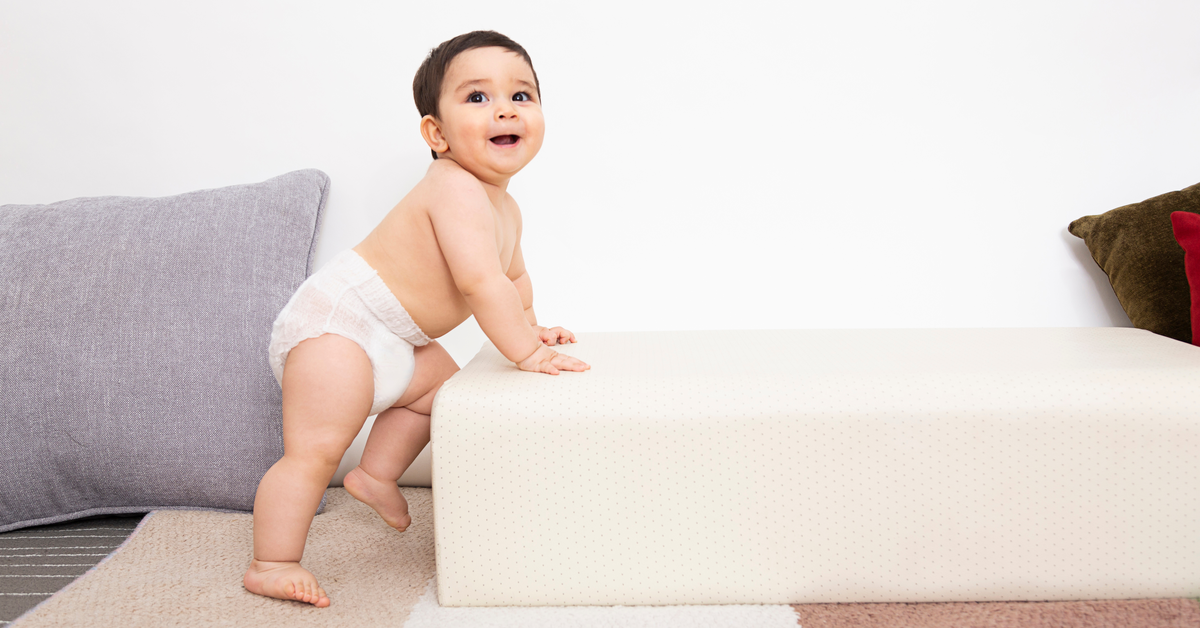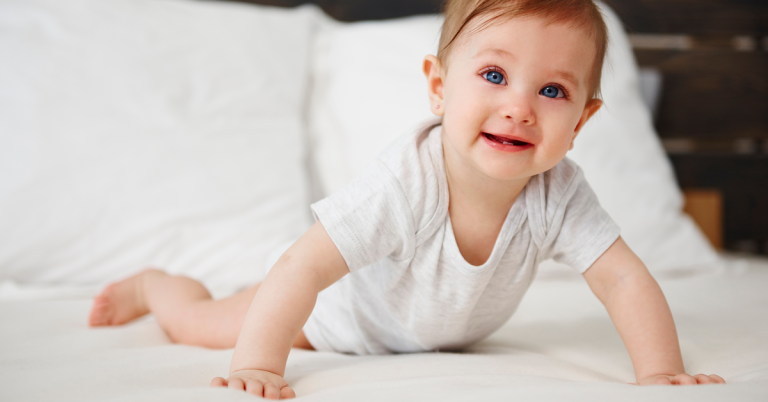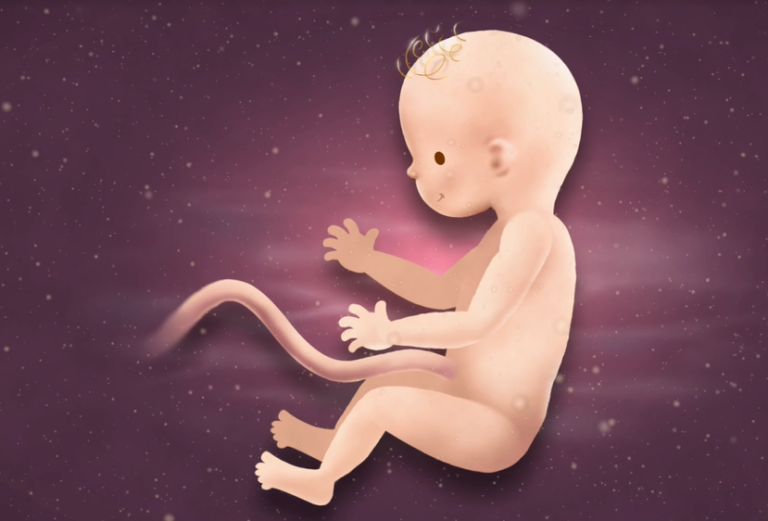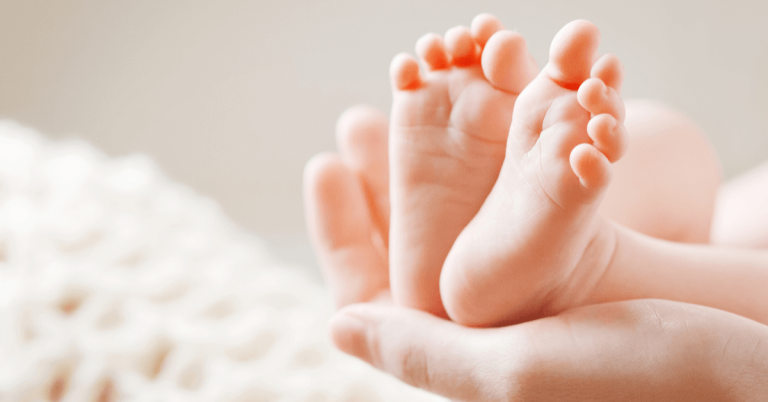Your little one is thirteen months old now and is rapidly growing. At the same time, you are constantly seeing and learning new things about his care and development. You may have questions about many issues such as his height, weight, walking, speaking, and feeding. You may be wondering if your baby is developing as he should. In this article, you can find answers to your questions about thirteen-month-old baby development and all the different aspects of this special period.
Measures at Thirteen Months
From the moment they are born, babies are constantly monitored in terms of weight, length, and development to provide the earliest possible intervention for any health problems or developmental delays. Therefore, regularly having your baby checked by a health professional is very important.
One of the things parents are most curious about is their baby’s weight. This month, your baby will gain 0.2–0.8 kg and grow an average of 1–4 cm.
| Weight | Length | Head Circumference | |
| Girl | 7.3 – 11.6 kg | 70.3 – 80.2 cm | 42.6 – 47.7 cm |
| Boy | 8 – 12.1 kg | 72.4 – 81.5 cm | 49.9 – 48.8 cm |
Your little one is much more active than before. Because of this, you may observe a slowdown in his weight gain and growth. Each child’s growth rate differs, and some factors influence its speed:
- Your baby’s birth weight and length
- Genetics
- Hormones
- Gender
- Nutrition and sleep patterns
- Baby’s mobility
If you think your baby’s length and weight are above or below normal, it is best to discuss this with your paediatrician or health visitor.
Nutrition at 13-Month-Old Baby
As babies get older, there may be some changes in their feeding patterns. Next to eating meals and snacks, a thirteen-month-old baby still requires breastmilk or formula. However, there may be a decrease in his interest in food because your little one is more interested in exploring the world as his mobility increases, and he may even start to walk. In addition, your baby’s need for calories decreases somewhat compared to the first months. For this reason, he doesn’t get hungry as often as he used to.
The following issues are common at thirteen months:
- Your baby may refuse to eat or suddenly lose his appetite.
- His need to drink milk during the day or night may decrease.
- He may prefer to eat without assistance rather than being fed by someone else.
- He may no longer want breakfast first thing in the morning.
- He may become fussy and stop eating certain foods he liked before.
When you experience any of these issues, keep calm and refrain from insisting too much. Putting pressure on your baby may make meals into a stressful instead of enjoyable time. When your little one is hungry, he will ask for food and won’t starve himself. At the same time, make sure he consumes the necessary nutrients daily.
Therefore, offer a variety of healthy foods at every meal, and avoid junk food and processed products as much as possible. At thirteen months, your baby’s menu must include proteins, grains, vitamin C, iron- and calcium-rich foods, leafy greens, vegetables, and fruits. Ensure that the dishes you prepare are not overly spicy, salty, or oily. You can make eating enjoyable for your baby by creating a feeding routine, getting him to participate in setting the table, and creating an environment where he can eat like an adult!
Sleep Pattern at 13-Month-Old Baby
At thirteen months, babies sleep eleven to twelve hours at night. During the day, they nap once or twice, for a total of two to three hours. Sleep patterns may vary. Whether your little one gets tired or not largely depends on his activities during the day. This directly affects his daily need for sleep. In addition, growth spurts can also disrupt sleep patterns from time to time. In total, your baby sleeps for fourteen to fifteen hours.
Motor Development at 13-Month-Old Baby
Parents’ most frequently asked questions are about physical development, nutrition, and sleep patterns. Babies gain different skills every day during this period. So what can your thirteen-month-old baby do now?
- Can climb objects, such as armchairs, chairs, and tables.
- Can sit unaided.
- Can get up by holding on to something.
- Can crawl up and down the stairs.
- May try to walk by taking a few steps.
- Can hold his bottle, cup, or spoon.
- Even if he is spilling, he can put a spoon in his mouth and eat on his own.
- Can learn to take off loose clothes and socks.
- Loves mixing and emptying the content of drawers and cabinets.
- Can put an object in a box.
- Can throw away items.
- Can indicate body parts such as his eyes, ears and nose when asked.
- Can turn the pages of a book.
- Can clap with his hands.
- Can build a two-block tower.
- May start to imitate the movements of the people around him.
- Starts dreaming and may wake up more frequently during the night.
- Can wave bye-bye.
- Can hold a pencil and randomly scribble on paper or in a colouring book.
Language Development and Speech Skills at 13-Month-Old Baby
Parents are very curious about when their child will start talking. Language development gains momentum during this period. While developing his imitation skills, your little one will try to reproduce the sounds he hears and discover his voice. There is an increase in the number of words your baby learns and says. He will also be able to respond to simple instructions you give.
A child who is thirteen months old,
- can use syllables such as ba-, de-, this- to ask for something or to point something out. For example, he may use ‘this’ instead of “give me water, please.” This is shorthand communication that he will discover himself.
- can recognise his name and the names of other family members.
- may learn to say a few meaningful words, such as “mom,” “dad,” “water,” “gone,” “come,” and “give.”
- can understand it when you say, “Daddy/Mommy is gone.”
- can grasp simple instructions and understand when you object to something.
- will babble and make different sounds with a loud voice.
Social Skills of a 13-Month-Old Baby
At thirteenth months old, your baby becomes more social and starts communicating with strangers. He can communicate with his friends and share things with them. He can communicate with you verbally to indicate his wishes instead of crying. Also, he may grow very fond of his independence. He may prefer to play alone or want to do things on his own. Personality traits may become more pronounced (playful, stubborn, funny, or irritable). His character slowly begins to take shape.
Safety
This is a time when babies become more active, and their curiosity increases. Since your baby loves exploring and doing everything himself, you may have to increase the safety measures in your house. Your little one can be injured by heavy items while trying to empty cupboards and drawers within reach. He may try to climb high places such as tables, chairs or bookcases. And he may start playing with electrical sockets. Baby safety items, such as cabinet and drawer locks and plug covers, will make your baby-proofing effort much easier.
Toilet
The toilet pattern of a thirteen-month-old largely depends on its diet. Some breastfed babies continue to soil their diapers after each feeding. However, introducing solids, especially in those who have stopped breast milk, will cause your baby’s stools and defecation patterns to become like an adult’s.
When your baby is thirteen months old, he may have just started walking, besides loving other physical activities like crawling and trying to climb or descend stairs. Take this into regard when selecting diapers and opt for flexible pull-up models that do not restrict your baby’s movements. Frequent diaper changes may make your baby feel more comfortable so that his focus is not on his diaper.
Plays and Toys Suitable at 13-Month-Old Baby

Just as always, plays and toys are very important for a thirteen-month-old baby. It is important to choose age-appropriate games and toys to increase your baby’s social skills and teach new concepts.
- Give-and-take: As he now understands simple instructions, one of the funniest games is give-and-take. Use an object he loves and engage in mutual giving and taking. Encourage your child by thanking him after each transaction.
- Hide-and-seek: Your little one will have a lot of fun when you’re hiding, and he’s trying to find you and vice-versa. He will be over the moon when he notices you are “unable” to find him!
- Throw-and-bring: When he discovers throwing, you can play a throw-and-bring game. Let your baby throw away an object for you to fetch. When changing roles, throw the item a little farther away and support your baby to get it. This is a very good game for his physical development and learning to walk.
- Imitation: You can do certain movements together with your little one. Do something that makes him laugh and ask him to imitate you.
- Where is the toy? Play hide-and-seek with a twist by hiding a toy and asking your baby to find it. Your kid will curiously go looking for his lost toy.
These games attract the attention of a thirteen-month-old baby, allow you to spend quality time together and form a perfect opportunity to communicate.
In addition, by giving your little one educational toys to play with, you can help him establish cause-effect relationships and develop his intelligence. You can opt for:
- Nested boxes
- Large shape matching puzzles
- Wooden blocks
- Soft plush toys with sounds, music, and speech
- Colourful Mega Bloks or Lego Duplo are also ideal.
How to Support Your Baby’s Development
Many parents want to know how they can support their thirteen-month-old baby’s development:
- You can help your baby to take his first steps by buying a push toy or a ride-on car.
- Chat with him often and have long conversations while articulating well and making eye contact. It will help him recognise sounds and words.
- Take your baby to places he has never been before. Have him watch and observe his new surroundings by naming what you see, so he learns and discovers new things.
- Read books and fairy tales and sing songs to him.
- When teaching a new concept, repetition is key.
- Don’t put too much pressure on your baby, and don’t insist when he is irritable and wants to do something independently.
This article has touched upon the most common and intriguing things about thirteen-month-old baby development. Remember that every child develops at their own pace, and do not panic if your child has not yet reached one of the milestones discussed here. Each child’s interests differ, influencing what areas he develops first.
Shopping Advice – What to Buy?
Your thirteen-month-old baby will love a nice shape-matching puzzle and large building blocks or nested blocks. A ride-on or push toy will assist his gross motor development. Also, buying the necessary baby safety products will give you more peace of mind. Please look at our website, read other parents’ reviews and buy the items of your choice at affordable prices at ebebek.
It’s Your Turn Now – Write a Comment
How are you raising your thirteen-month-old baby? What challenges did you experience this month? How did you overcome them? We welcome your comments to support and inspire other caregivers.
Don’t Forget to Share!
Don’t forget to share our 13-month-old baby development article so other caregivers and expectant parents can read and learn!







